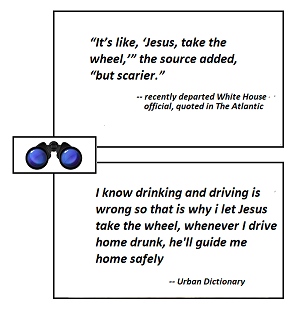Descendit ad inferos, he descended to those below..
Sunday, April 21st, 2019[ by Charles Cameron — the low down, the vanishing point, and the exaltation ]
.
There is no Christ: he has died, he is not yet resurrected. According to the usual English translation of the most basic of the Church’s three statements of faith, the Apostles’ Creed, he descending into hell: or as Ephesians 4.9-10 has it:
Now that he ascended, what is it but that he also descended first into the lower parts of the earth? He that descended is the same also that ascended up far above all heavens, that he might fill all things.
This worldly world is no place into which such doctrines comfortably fit. Hell? The lower parts of the earth?
No, there is a low doorway by which we may enter such a cosmos, encounter such a Christ. We must shed, in fact, reality and self-importance, twin delusions, and embrace imagination.
Above all heavens?
**
The second to final section of Bach’s St John Passion deals with this intermediate state, the boirderland between life and death, in this melancholy yet resigned chorus, Ruht wohl, ihr heiligen Gebeine:
The lyric addresses the now dead Christ
Rest well, you blessed limbs,
now I will no longer mourn you,
rest well and bring me also to peace!
The grave that is allotted to you
and encloses no further suffering,
opens heaven for me and closes off Hell.
**
The Latin of the Apostles’ Creed does not actually say that Christ descended into hell, but that he descended to those below, and this in turn is interpreted to mean that he came to those of good character who died before his coming, and were thus unable to hear the gospel he preached until this Holy Saturday — his body in the tomb, his presence preaching to them for their salvation. We are thus offered a neat answer to the otherwise tricky question — what happened to those who, through no fault of their own,never heard him.
For Christianity, this is the archetypal liminal moment, this day between crucifixion and resurrection, death and renewed life. How unimportant it seems, how humble, falling between Good Friday and Easter Day — yet there is beauty here, as the whole gospel story is beautiful.
But there is more. It is characteristic of the Passion story that Christ touches the depths of human doubt on the cross — crying My God, my God, why hast thou forsaken me?
**
As I have noted before, the Lakota medicine man Archie Fire Lame Deer told his biographer, Richard Erdoes:
I am no wino or pishko, but I am no saint either. A medicine man shouldn’t be a saint. He should experience and feel all the ups and downs, the despair and joy, the magic and the reality, the courage and the fear, of his people. He should be able to sink as low as a bug, or soar as high as an eagle. Unless he can experience both, he is no good as a medicine man.
Ifb you have not suffered as deeply as those who come to you with their sufferings, you will seem shallow to them, and be unable to console them. If youhave not experienced joy as fully as those who rejoice nearby, you will seem stiff and stilted to the, and cannot join thewir dance, their song/\.
Christ on the cross, Christ in the tomb descending to those below — bith are instances of that same descent which is the natural accompaniment of sacent — just as Chrust’s birth in a stable — no room at the inn — is the descen to vulnerable humanity of Godhead impassible — beyond all suffering.
It is in the descent that the ascent is prepared.
**
Or as Heraclitus says:
The way upward and the way downward
is one and the same
Or St John of the Cross, greatest of Spanish mystics, writing of the Dark Night of the Soul:
Although this happy night brings darkness to the spirit, it does so only to give it light in everything; and that, although it humbles it and makes it miserable, it does so only to exalt it and to raise it up; and, although it impoverishes it and empties it of all natural affection and attachment, it does so only that it may enable it to stretch forward, divinely, and thus to have fruition and experience of all things, both above and below, yet to preserve its unrestricted liberty of spirit in them all.
And again, as TS Eliot has it, who quoted that fragment of Heraclitus as an epigraph to his Four Quartets:
And the way up is the way down, the way forward is the way back.
**
I have written this post, this day, to teach myself these things, to do the necessary research, the discovery and the remembering: and I hope they will be of interest and profit to you too.
But I must post in haste — Easter Day approaches, and with it the joyful cry, Christ is risen! Christos aneste.
For your consideration — this I must listen to myself:
For joy!




